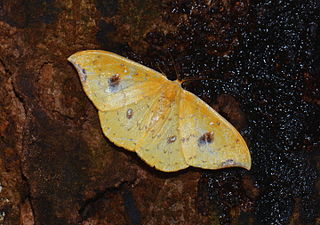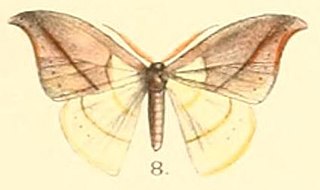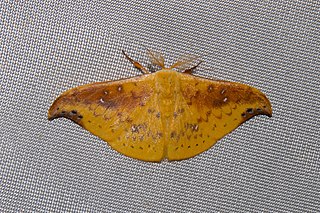
Tridrepana is a genus of moths belonging to the subfamily Drepaninae.

Tridrepana fulvata is a moth in the family Drepanidae. It was described by Snellen in 1876. It is found in China, India, Myanmar, Malaysia and Indonesia.
Tridrepana maculosa is a moth in the family Drepanidae. It was described by Watson in 1957. It is found in the Chinese provinces of Sichuan and Yunnan.
Tridrepana marginata is a moth in the family Drepanidae. It was described by Watson in 1957. It is found in Yunnan, China.

Tridrepana postica is a moth in the family Drepanidae. It was described by Frederic Moore in 1879. It is found in north-eastern India and Malaysia.

Tridrepana subtusmaculata is a moth in the family Drepanidae. It was described by Max Gaede in 1933. It is found on Peninsular Malaysia and Borneo.
Tridrepana adelpha is a moth in the family Drepanidae. It was described by Swinhoe in 1905. It is found in north-eastern India.
Tridrepana melliflua is a moth in the family Drepanidae. It was described by Warren in 1922. It is found in New Guinea, but probably also occurs in Papua New Guinea.
Tridrepana sigma is a moth in the family Drepanidae. It was described by Allan Watson in 1957. It is found in Indonesia.
Tridrepana acuta is a moth in the family Drepanidae. It was described by Allan Watson in 1957. It is found in Sri Lanka and possibly southern India.
Tridrepana trialba is a moth in the family Drepanidae. It was described by Allan Watson in 1957. It is found on Sulawesi in Indonesia.
Tridrepana spatulata is a moth in the family Drepanidae. It was described by Allan Watson in 1957. It is found on Luzon and Mindanao in the Philippines.
Tridrepana mediata is a moth in the family Drepanidae. It was described by Warren in 1922. It is found in New Guinea, extending to Goodenough Island and Sudest Island in the south-west.
Tridrepana sera is a moth in the family Drepanidae. It was first described by William Warren in 1896. It is found on Fergusson Island and in New Guinea.
Tridrepana septempunctata is a moth in the family Drepanidae. It was described by Warren in 1896. It is found in Assam in India and on Sumatra in Indonesia.

Tridrepana examplata is a moth in the family Drepanidae. It was described by Warren in 1922. It is widely distributed in New Guinea, where it is especially common in mountainous areas.
Tridrepana olivacea is a moth in the family Drepanidae. It was described by Warren in 1922. It is found in New Guinea, extending to Goodenough Island and the Bismarck Archipelago.
Tridrepana obliquitaenia is a moth in the family Drepanidae. It was described by Warren in 1922. It is widely distributed in New Guinea.
Tridrepana rectifascia is a moth in the family Drepanidae. It was described by Allan Watson in 1957. It is found on Mindanao in the Philippines.
Tridrepana aurorina is a moth in the family Drepanidae. It was described by Felix Bryk in 1943. It is found in north-eastern Myanmar.




